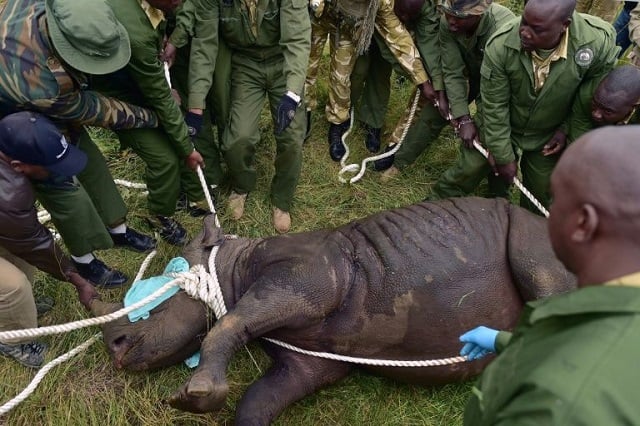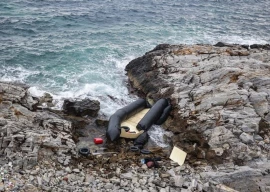
The one surviving animal from last month's attempt to transfer 11 rhinos from Nairobi and Lake Nakuru national parks to Tsavo East is in a critical condition and could also die after being attacked by lions.
Tourism Minister Najib Balala, who had ordered detectives to investigate the fiasco, said at a briefing in Nairobi that several of the Kenya Wildlife Service (KWS) officials involved in the deadly operation had been suspended.
"Yesterday the tenth rhino died. Also unfortunately the eleventh rhino has been attacked by lions yesterday. (It) was treated and so far we are monitoring that eleventh rhino," he said.
World's last male northern white rhino euthanised in Kenya
"According to the inquiry team the cause of all the deaths was... multiple stress syndrome intensified by salt poisoning," he added, admitting there had been "negligence" by the transfer team.
Last week the minister suggested that the rhinos may have become dehydrated and died after drinking saline water in their new habitat.
Save the Rhinos estimates there are fewer than 5,500 black rhinos in the world, all of them in Africa, while Kenya's black rhino population stands at 750, according to the Worldwide Fund for Nature.
Between 2005 and 2017, 147 black rhinos were transferred to new habitats in Kenya, the tourism ministry said. Just eight died following those transfer operations.
Nepal embarks on 'rhino diplomacy' with rare gift to China
According to KWS figures, nine rhinos were killed in Kenya last year.
In May, three more were shot dead inside a specially-protected sanctuary in northern Kenya and their horns removed, while in March the last male northern white rhino on earth, an elderly bull named Sudan, was put down by Kenyan vets after falling ill.
Rhinos have few natural predators because of their size and thick skin but are targeted by poachers for their horns which are highly valued in parts of Asia where they are believed to have medicinal qualities.
Huge demand from China and Vietnam where the horns can fetch tens of thousands of dollars has led to a collapse in the number of rhinos in the wild.

















COMMENTS
Comments are moderated and generally will be posted if they are on-topic and not abusive.
For more information, please see our Comments FAQ